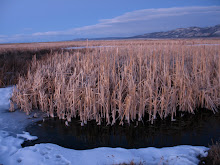This is an evolving resource page that I will amend as I become more educated through this project.
Wetlands are not just water and not just land, they are a transition zone between both, the combination of which creates a unique ecosystem and habitat. The balance of the overall ecology of our planet depends on these "middle kingdoms of bilogical diversity." Wetlands are considered to be the most biologically diverse areas on the planet.
Water is a unique life-giving substance any where, but in the desert water is truly miraculous providing the life-giving substance in an environment where most species could not otherwise survive.
Wetlands are natural water purification systems
According to Ronnie Citron-Fink, "Wetlands are the 'kidneys' of the landscape." She continues, "They have the ability remove excess nutrients, toxic substances, and sediment from water that flows through them, helping to maintain and improve downstream water quality. Studies show that pollutant removal rates for natural and restored wetlands indicate that, wetlands can retain significant percentages of nitrates, ammonium, phosphorus, and sediment loads. Natural wetlands have also been effective in removing contaminants such as pesticides, landfill, dissolved chlorinated compounds, metals, and stormwater runoff." You can read her entire article by clicking here.
Wetlands are not just water and not just land, they are a transition zone between both, the combination of which creates a unique ecosystem and habitat. The balance of the overall ecology of our planet depends on these "middle kingdoms of bilogical diversity." Wetlands are considered to be the most biologically diverse areas on the planet.
Water is a unique life-giving substance any where, but in the desert water is truly miraculous providing the life-giving substance in an environment where most species could not otherwise survive.
Wetlands are natural water purification systems
According to Ronnie Citron-Fink, "Wetlands are the 'kidneys' of the landscape." She continues, "They have the ability remove excess nutrients, toxic substances, and sediment from water that flows through them, helping to maintain and improve downstream water quality. Studies show that pollutant removal rates for natural and restored wetlands indicate that, wetlands can retain significant percentages of nitrates, ammonium, phosphorus, and sediment loads. Natural wetlands have also been effective in removing contaminants such as pesticides, landfill, dissolved chlorinated compounds, metals, and stormwater runoff." You can read her entire article by clicking here.
Interesting Water Facts
Water is essential to all life on planet earth, but it is unique for other reasons too!
- Water occurs in all three states: solid (ice), liquid (water), and gas (steam, fog and clouds). According to John A. Day, aka the Cloudman and author of The Book of Clouds,
"The reason for this lies in water's molecular structure, in the way that the two hydrogen and one oxygen atoms are arranged. Perhaps the best way ti describe a water molecule is to say that ut us a little out of electrical balance-there's a slight negative charge to the oxygen side and slight negative charge on the hydrogen side. Since opposite charges attract, the hydrogen side of one water molecule forms a link - not a very strong one, but a link nonetheless - with the oxygen side of another. Some of these links, called hydrogen bonds, must be broken in order to turn ice into water. All of them must be broken to turn water into vapor. It takes large amounts of energy to break the links [32 degrees Fahrenheit for freezing and 212 degrees Fahrenheit for boiling}....If water were 'normal', then at earth's temperatures it would only exist as a gas. There would be no oceans, no lakes, no rivers, and no rain - no water cycle at all."Invasive Wetland Species
Dydimo or Rock Snot is an invasive algae that affects waterways water species.
February 2nd is World Wetlands Day, but let's celebrate our wetlands year round!
February 2nd is World Wetlands Day, but let's celebrate our wetlands year round!





